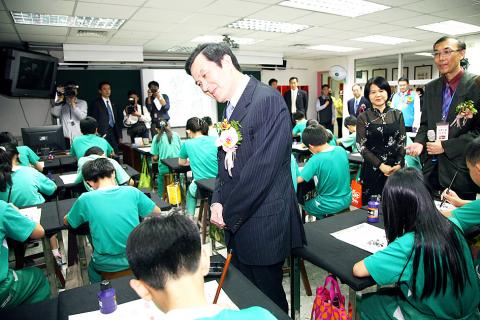Taiwan will not avoid cross-strait political issues, but the time is not right for political talks with China, President Ma Ying-jeou (馬英九) said yesterday amid concerns about possible moves by his administration toward political negotiations with Beijing.
In an interview with the Washington Post, Ma said the government did not intend to pass the political issues on generation to generation when asked to comment on Chinese President Xi Jinping’s (習近平) call for Taiwan to prepare for political negotiations.
He said for the two sides of the Taiwan Strait to engage in political talks and discuss the signing of a peace accord, his administration would seek a clear public consensus on the issue, while reiterating his principle in handling cross-strait issues, which is to address the easier and pressing issues first, before tackling difficult ones, such as politics.

Photo: CNA
“We are willing to discuss any issue as long as it is an urgent one,” he said.
He also dismissed a direct meeting with Xi during his term, insisting that such a meeting could only take place with the support of the Taiwanese public.
While insisting on an “economics first, politics later” policy for dealing with China, Ma said the government would not avoid addressing political issues.
Citing the signing of cross-strait agreements and the proposed establishment of cross-strait representative offices, Ma said these issues carried some political significance, and the government is also promoting the service trade agreement to enhance cross-strait exchanges and enable Taiwanese to profit from them.
He dismissed concerns about the nation’s sovereignty under fast-paced cross-strait development, and attributed the nation’s economic pacts with Japan and other major trade partners to improved cross-strait relations.
“They say we are selling out Taiwan and that we lost something, but they never say what exactly we have lost,” he said.
Ma also defended Taiwan’s relations with the US during his term, and said it was vital that Washington continued to sell arms to Taiwan.
He shrugged off his record-low approval rating, and said he has no desire to change cross-strait and domestic policies, insisting that the nation has made progress in every area, he said.
“Not everyone understands this. But we have done what needed to be done, and we will keep doing so until the very end,” he said.
When asked about the political rift between him and Legislative Speaker Wang Jin-pyng (王金平), Ma — who doubles as Chinese Nationalist Party (KMT) chairman — said the KMT has remained united despite the incident, adding that the case regarding Wang’s alleged improper lobbying will be resolved in court.

MORE VISITORS: The Tourism Administration said that it is seeing positive prospects in its efforts to expand the tourism market in North America and Europe Taiwan has been ranked as the cheapest place in the world to travel to this year, based on a list recommended by NerdWallet. The San Francisco-based personal finance company said that Taiwan topped the list of 16 nations it chose for budget travelers because US tourists do not need visas and travelers can easily have a good meal for less than US$10. A bus ride in Taipei costs just under US$0.50, while subway rides start at US$0.60, the firm said, adding that public transportation in Taiwan is easy to navigate. The firm also called Taiwan a “food lover’s paradise,” citing inexpensive breakfast stalls

TRADE: A mandatory declaration of origin for manufactured goods bound for the US is to take effect on May 7 to block China from exploiting Taiwan’s trade channels All products manufactured in Taiwan and exported to the US must include a signed declaration of origin starting on May 7, the Bureau of Foreign Trade announced yesterday. US President Donald Trump on April 2 imposed a 32 percent tariff on imports from Taiwan, but one week later announced a 90-day pause on its implementation. However, a universal 10 percent tariff was immediately applied to most imports from around the world. On April 12, the Trump administration further exempted computers, smartphones and semiconductors from the new tariffs. In response, President William Lai’s (賴清德) administration has introduced a series of countermeasures to support affected

CROSS-STRAIT: The vast majority of Taiwanese support maintaining the ‘status quo,’ while concern is rising about Beijing’s influence operations More than eight out of 10 Taiwanese reject Beijing’s “one country, two systems” framework for cross-strait relations, according to a survey released by the Mainland Affairs Council (MAC) on Thursday. The MAC’s latest quarterly survey found that 84.4 percent of respondents opposed Beijing’s “one country, two systems” formula for handling cross-strait relations — a figure consistent with past polling. Over the past three years, opposition to the framework has remained high, ranging from a low of 83.6 percent in April 2023 to a peak of 89.6 percent in April last year. In the most recent poll, 82.5 percent also rejected China’s

PLUGGING HOLES: The amendments would bring the legislation in line with systems found in other countries such as Japan and the US, Legislator Chen Kuan-ting said Democratic Progressive Party (DPP) Legislator Chen Kuan-ting (陳冠廷) has proposed amending national security legislation amid a spate of espionage cases. Potential gaps in security vetting procedures for personnel with access to sensitive information prompted him to propose the amendments, which would introduce changes to Article 14 of the Classified National Security Information Protection Act (國家機密保護法), Chen said yesterday. The proposal, which aims to enhance interagency vetting procedures and reduce the risk of classified information leaks, would establish a comprehensive security clearance system in Taiwan, he said. The amendment would require character and loyalty checks for civil servants and intelligence personnel prior to